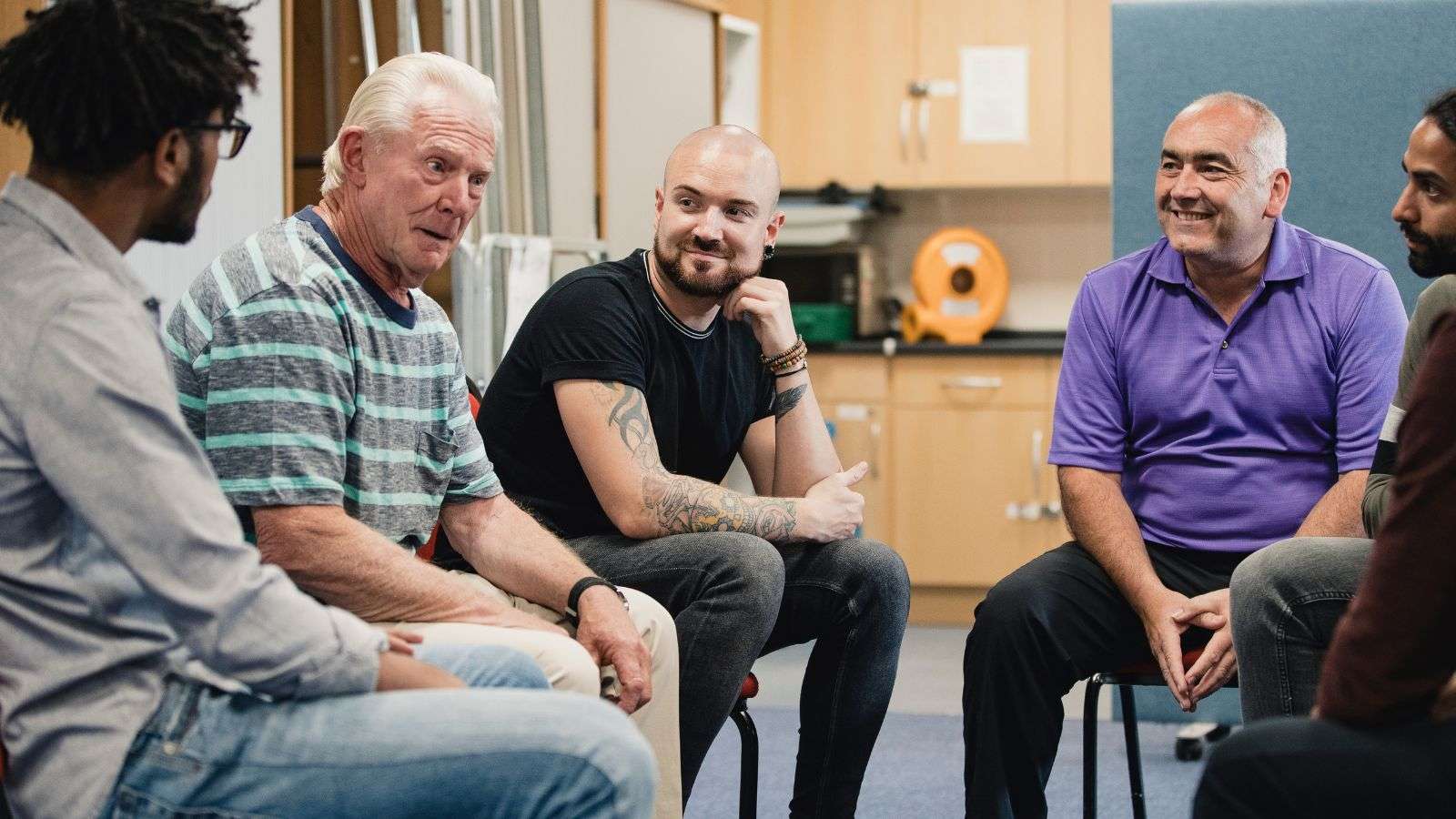Reviewed By Pamela Kirkpatrick - Senior Accredited NCPS & Registered Member MBACP Adv. Dip.
The Benefits of Group Support
31 July 2024
While professional mental health support is helpful for some, maybe even life saving, it's equally important to shed light on the benefits of alternative interventions, like peer support or group work.
*Please note that participants names have been altered to safeguard their privacy.*
At Find Help NI, we understand that life's journey is full of twists, turns, and sometimes, unexpected challenges. This can leave us feeling lost, alone, anxious or maybe even depressed. It’s at times like these that we may decide to reach out for help or consider a new self-care activity.
Maybe you have reached out for help from a helpline, your GP or a therapist, but you still feel stuck? Maybe you don’t like the idea of meditation or mindfulness? Maybe you aren’t physically able to get out for walks in nature, or go sea swimming.
While professional mental health support like Talking Therapy and medication can be so helpful for some, maybe even life saving, it's equally important to shed light on alternative interventions that can complement your unique journey toward healing. Wellbeing doesn’t have to be addressed with ‘a one size fits all’ approach.
That's precisely why we want to delve into the advantages of group and peer-to-peer support.
Local Wellbeing Group Support
We recently had the pleasure of chatting with Simon Taylor, the dedicated wellbeing coach at "Living From The Inside Out Group" in Bangor, County Down.
Simon explained that his role within the group is first and foremost as a participant but when necessary he is a teacher, facilitator, coach and mentor.
“My most important role is as a listener. People need space to be heard and when this is available they solve their own problems.” Simon says he is passionate about changing lives from the inside out.
Simon generously offered us a glimpse into the world of community-driven peer support services by extending an invitation to a member of the Find Help NI team, to attend one of their sessions and gain deeper insights. We engaged in conversations with the group's members, enquiring into their personal journeys from facing wellbeing challenges to the moment they made the decision to become a part of this supportive community.
Joining a Peer or Group Support Group
We chatted with group members, Barbara and Jenny, who shared some insights into how they came to attend the group.
Barbara explained:
“I’d been experiencing depression & anxiety for a while and had just started medication prescribed by my GP. I then found out about the group from a friend and decided to give it a try. I had such high levels of stress when I first attended and I did struggle to engage with the group at first. It was interesting because once the medication started to take effect I was in a much better place to get the most out of the support here.”
Jenny added:
“I’ve got to a place where I’m really ready to commit to self-care and my wellbeing. I was attending talking therapy every other week and she suggested this group to me. I attend the group as an additional commitment to my self-care. Sometimes the group is the only thing I’ve done in a week for my self-care. I leave here feeling inspired, motivated and ready to take on the week with more positivity, peace and compassion."
The Benefits of Peer to Peer Support
After taking in the experiences and thoughts of all participants it became clear that there were a whole host of benefits that we’ve summarised below, along with some participant comments.
1. Empathy and Understanding
Peers can relate to your experiences, providing a sense of understanding and validation that promotes a feeling of not being alone in your struggles.
“I think group work is really underrated, and the peer to peer aspect makes you feel much less alone. We are all on a similar journey and we are all rooting for each other.”
2. Non-Judgmental Environment
Peer support groups offer a safe space where you can freely express your feelings without the fear of judgement.
3. Shared Experiences
Learning from others who have faced similar challenges can offer practical insights and coping strategies.
“Outside of this group, when someone asks, how are you? I do put up a mask. But here, we can comfortably share how we are really feeling. I’ve bonded with people because we have similar experiences, they can truly empathise with how I feel, and they understand where I have come from in terms of my wellness and quality of life.”
4. Reduced Isolation
Engaging with peers combats the sense of isolation that often accompanies mental health issues.
“I was a carer for many years, then I became ill myself which meant that I lived a very isolated lifestyle. I became depressed and anxious. I did try counselling, but it just didn’t work for me. I was aware that my experiences have led me to be very reclusive and I knew that wasn’t good for me. This group has totally changed my thought process, how I look at things, it’s improved how I handle my feelings and emotions about the past and in the now. It’s given me the opportunity to build self awareness, resilience and I feel far more at peace.”
5. Enhanced Coping Skills
Sharing strategies that have worked for others can help you develop effective coping mechanisms.
“I feel like you can learn so much from everyone in the room. From different viewpoints to helpful tips I maybe hadn’t considered. It can be really inspiring and motivating to hear of another group member's success with a new self-care activity for example.”
6. Hope and Inspiration
Witnessing the progress and success of others can instil a sense of hope for your own journey.
7. Mutual Encouragement
Peers provide encouragement and motivation, fostering resilience and determination.
“I think it’s important to highlight that group or peer to peer support isn’t just a whinging session. It’s not about who is worse off, what diagnosis you have, what medication you are on, or how bad you have it. The focus is on improving our mental health and encouraging healing together, so we keep it positive, non-judgemental, we keep a “can do” type attitude to ensure no one gets stuck in the mud.”
8. Personal Growth
Being part of a supportive community can encourage personal growth and a positive outlook on life.
“I find communicating very difficult, actually most of the time I don’t want to. It’s interesting though that coming to this group has helped me with that too. Hearing other people share, encourages me to share. Feeling heard, and feeling the empathy in the room is really validating. Someone sharing words of comfort, understanding or wisdom makes you want to return the favour. It feels natural, authentic and personal than other therapy I’ve tried.”
9. Validation
Sharing your experiences and receiving validation from peers can lead to a sense of validation and self-worth.
10. Holistic Perspective
Peers often offer diverse perspectives, promoting a more comprehensive understanding of your situation.
“I’m so glad I took that leap of faith to come to this group. I’ve encountered many traumas from childhood to now and I’ve never received or reached out for any mental health support. What I’ve learned and experienced here has made me realise that there are many paths to healing, that healing from the past is possible and that I can handle what life throws at me with the new insights that I have!”
11. Safe Outlet
Peer groups offer a safe place to express emotions and discuss challenges without fear.
“I think what helps, as awful as it sounds, is that you know that other people are suffering too. You don’t feel alone in your struggles. It makes me feel safe enough to share my experiences, because you quickly get to know people, you bond. You’re on this journey together.”
12. Long-Term Support
Peer networks can provide ongoing, consistent support that extends beyond formal therapy sessions.
“I have social anxiety and Asperger's. So coming to the group at the start was really difficult for me. I really struggled to communicate at all. Now that I have been attending for over a year, I’ve come through lots of different ups and downs that life has thrown at me and this group has felt so supportive, verbally and in their actions, both inside the group and outside the group too. I can now confidently communicate my feelings and feel like I have a support group of people that I can call friends.”
13. Boost Self-Esteem & Empowerment
Helping others and being helped in return can boost a sense of empowerment, our self esteem and our sense of purpose too.
“It’s swings and roundabouts in here. Sometimes we give words of encouragement and other times we need them. Everyone here is so supportive, often reminding each other how far we’ve come. It feels really great to be part of something as special as this group.”
One thing is for sure, this group has had a big impact on the lives of the attendees. Many say that they wouldn’t be in such a strong place without it.
Exploring Group Support in Your Community
Don't underestimate the power of group or peer support when it comes to your wellbeing and mental health. These services can cultivate a dynamic and nurturing environment, providing a safe space where you can engage with others facing similar challenges or experiences. It's a place where you can both give and receive support, nurturing personal growth, resilience, and a deeper sense of community.
For some individuals, group support might be all they need to enhance their wellbeing. For others, it can be a valuable addition to compliment to other forms of professional help. We encourage you to explore the benefits of group or peer support services by attending one near you and experiencing it first-hand.
To discover organisations offering Peer Support, Group Work, or Therapy, use the search feature on Find Help NI's directory.
Alternatively, you can browse our blog and resource pages for inspiration and self-help materials.
Featured Organisation
Local
uHub is a counselling service with a multi-disciplinary approach to emotional health and well-being. We provide a safe and confidential environment where feelings can be explored. We work from an integrated approach, psychodynamic/person centred which we tailor to meet the needs of each individual so they can get the best possible service and experience from their counselling.
Get Inspired Further
feed a family of 5 for a week for under 25
I’ve come up with a simple low cost meal plan for a family of 5. We based it on a food shop at ASDA using mostly ESSENTIALS RANGE of food items.
Teens, Social Isolation & Screentime
As parents we want the best for our children, and we can spend a huge proportion of our time worrying about what they are doing especially when it comes to screen time and shutting themselves away in their bedroom.
dealing with conflict
Conflict in relationships is not always negative, if both partners are willing it can provide an opportunity for making change and can help identify and solve problems.




